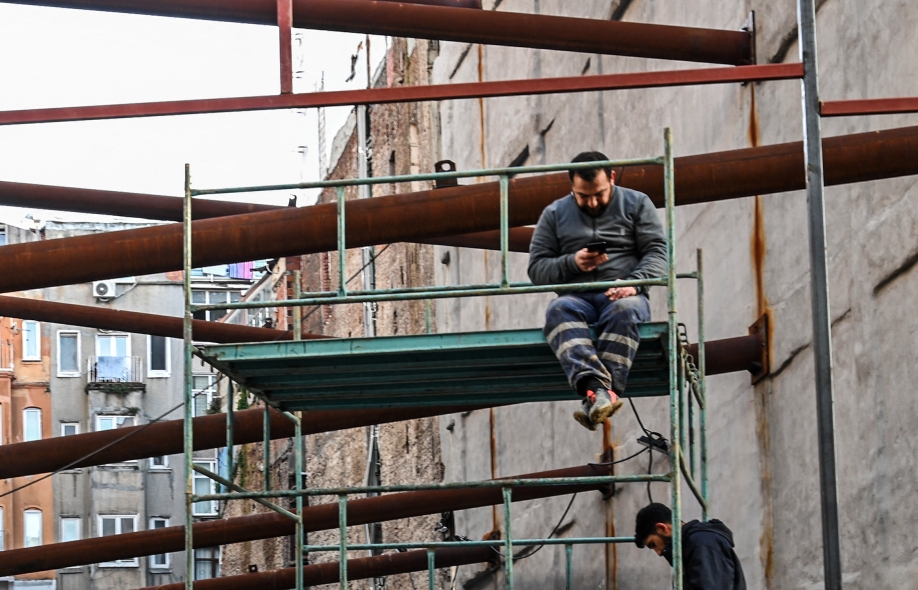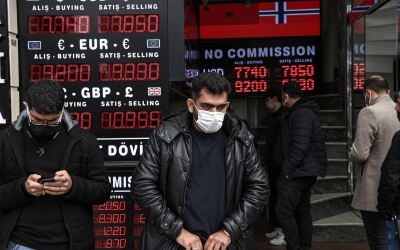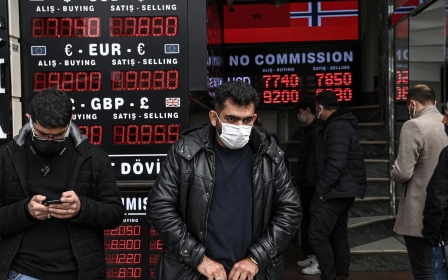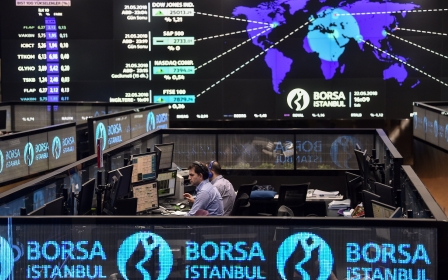Turkey: Rental and house prices skyrocket amid lack of supply

“Now, we must live in my brother-in-law’s flat, a 50-square-metre one. There is no private space for us, even no place for our baby to sleep comfortably,” Abdullah Pinar, who works at a TV production company, tells Middle East Eye.
Pinar and his wife Suna are well-educated, qualified people, working in Turkey's media sector and, indeed, earning more than average salaries.
However, their efforts to find a suitable flat in a good location in Istanbul with access to transportation have remained futile so far, due to a mind-blowing increase in prices.
Since July last year, rental prices have increased by 38 percent across Turkey and around 27 percent for property sales. Even middle-class, white-collar workers are feeling the increasing cost of living.
“We really don’t know what to do,” said Pinar, adding that “I have never felt this desperate.”
The crisis is so huge that the Republican People’s Party (CHP), Turkey's main opposition party, has called on the government to intervene in the housing market.
Ayhan Barut, a CHP MP for Adana, a city in the south of the country, said: “The prices are going higher and higher. There has to be legal regulation.”
There has been no comment from the government about the increasing rents. Instead, the government foresees that the rental inflation rate will decrease towards the end of this year.
Hepsi Emlak, a leading real property website, calculated that in Istanbul’s 50 neighbourhoods, rental prices have increased more than 50 percent in one year.
Shocked
Visiting a property agency in Turkey's largest city, another middle-class couple were shocked by the asking prices, which would mean a third of their monthly income going towards rent
“There's no way that we can afford 4,500 TL ($540) per month for this old flat,” Omer Yasar grumbled. His wife’s and his salary amount to 14,000 TL ($1,670).
Yasar was unhappy with the idea of spending one third of their income on rent at a time when the general cost of living is increasing day by day.
“What if we pay 48,000 TL ($5,730) for one year,” he asked Ihsan Sari, an estate agent in Uskudar, one of the most central locations on Istanbul’s Anatolian side.
Sari shrugged his shoulders: “No way that we can reduce the price. Dozens have phoned me since I put this flat to the list. One of them will definitely give the price that the landlord asked.”
Demand and supply broken
Yasar and his wife, Banu, who are both researchers at Istanbul University and again earning higher than average wages, have been hunting for a flat for the past two months.
Sari admits the flat is overpriced: “To be honest, the flat deserves a maximum of 3,500 TL ($420).
"But due to the current circumstances, the landlord is asking for 4,500 TL ($540). What is worse is that the price will never go down.”
Not only Istanbul but almost every city in Turkey is witnessing a dramatic increase in the prices of houses to let and for sale.
In Erzincan, for example, in the far east of the country, the increased cost of houses to let and to buy are on a par with the increases in Istanbul.
An average flat is about one million Turkish lira ($120,000).
Birtan Kadiroglu, who works at the EVSA property agency, told MEE, “The balance between demand and supply in the housing market is broken.”
Construction costs
Statistics show that the supply of houses has decreased by almost 90 percent over the last year.
The main reason for this has been the unprecedented increase in the prices of construction materials.
Construction expenses have quadrupled due to the high inflation rate and the loss in value of the Turkish lira, which has depreciated by 45 percent against the US dollar since the coronavirus pandemic began.
Some construction companies have recently declared that they will stop working because they can not afford the cost of materials. For instance, one tonne of cement was around 160 lira ($19) last year while it is now 500 TL ($60).
The Turkish Statistical Institute (TUIK) has also released numbers outlining that total construction expenses have increased by 42.5 percent in one year.
Earthquake threat
Turkey is situated at the intersection of several earthquake faultlines, especially in the heavily industrial cities of Izmir and Istanbul, which has been another factor forcing up prices.
“People are worried about earthquakes more than ever, which motivates them to look for newly built flats,” said Kadiroglu said.
Pinar says he does not want to live in a 40-year-old building, which was not built in line with the latest earthquake regulations.
“Things went crazy. My wife and I don’t want to die of an earthquake, so look for a solid building," he said.
"We’ve visited a flat for renting, close to [Istanbul's] Camlica Hill. The property agent said we were the eighth clients checking this flat, and there were two more couples.
"There is no fixed price for the flat. It is minimum 4,500 TL ($540) but the agent asked for our proposal as if we were in an auction.”
Pinar told MEE that he has visited more than 30 property agencies and at least half of them have said “there is no flat for rent”.
“It is normal that the prices increase in Turkey. There is no regulation of anything,” Ebubekir Topal, an assistant expert at a private transportation company, told MEE.
“I was about to buy a flat in Maltepe, a district on Istanbul’s Anatolian side.
"The price was 690,000 TL ($83,000) in July. Now, its owner asks for 900,000 TL ($108,000). The government must do something to stop this insanity.”
Government fuels price rise
According to the government, Turkey's economy expanded 1.8 percent year-on-year in 2020, despite the economic repercussions of the pandemic.
While official statistics show that the inflation rate is 19 percent, most landlords have increased prices above that rate, believing that the real rate is much higher.
“Currently, it is impossible to find a new flat for rent for a family of three in a central location below 4,000 TL ($480),” said Sari.
According to government figures, a family of four needs 9,457 Turkish lira ($1130) a month to stay above the poverty line.
However, the minimum wage in Turkey is 2,825 TL ($340) per month, while an official in a middle-ranking position in a state institution, or in a private company, on average earns around 8,000 TL ($900).
A temporary special mortgage scheme offered by the government last year offering lower interest rates, which was launched to offset the effects of the pandemic, has only deepened the cost crisis.
Ebubekir said: “Last year, the government decreased interest rates for house purchases to 0.64 percent monthly. Then [as a result], the prices [of houses] increased.
"Now, the interest rate is around 1.5 percent, but the flat prices are still the same.”
Last year's low-interest-rate scheme led to the sale of 1.5 million houses.
However, the number of sales remained much lower at 500,000 in the first half of 2021, after the interest rate went back up and prices remained high.
'Tent in the campus'
Yeni Safak, a pro-government media outlet, has accused property agencies of increasing prices to maximise their profits.
The newspaper's report claimed that the agencies were convincing landlords to demand higher prices so that their commission would increase, too.
Denying such claims, Kadiroglu at EVSA property agency said: “There is no point in doing so. The more flats you hire, the more and more frequently you earn.”
Meanwhile, university students have started a hashtag on Twitter, #cadirdakampus, meaning “tent in the campus,” highlighting that they will have to stay in a tent on their campus since prices have become so unaffordable.
Sari added: “Property agencies have nothing to do with this. This is a real property crisis. Look, now the universities are switching to onsite education.
"Let me tell you what is happening: the prices are going up. No house is left in Istanbul.”
Middle East Eye delivers independent and unrivalled coverage and analysis of the Middle East, North Africa and beyond. To learn more about republishing this content and the associated fees, please fill out this form. More about MEE can be found here.








